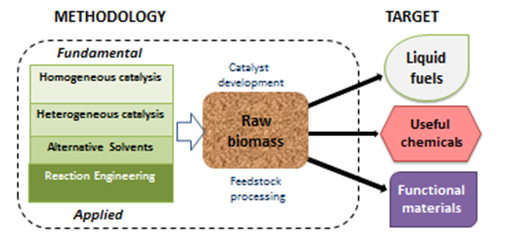Research
Research
The Barta group – Sustainable catalysis and renewable resources
The research in our group is centered around sustainability and Green Chemistry with a special focus on the conversion of renewable resources and catalysis using earth-abundant metals. Two main research areas are being pursued:
1.) synthesis and characterization of novel heterogeneous catalysis for the cleavage of lignocellulose resources, including pre-treatment and characterization.
2.) development of new homogeneous catalytic methods for the atom-economic functionalization of the obtained building blocks.
Selection of research projects
Lignin to aromatic monomers : One core expertise is the depolymerisation and defunctionalization of lignin to aromatic monomers using simple acid catalyzed methods that can be relevant in future biorefinery approaches. Here we are particularly interested in the identification and in situ stabilization of reactive intermediates obtained after lignin acidolysis.
Lignin depolymerization using CuPMO catalysts: Here, for selective bond cleavage reactions copper based catalysts are used. At milder reaction temperatures, aromatic monomers are obtained. Model compounds and real lignin feeds are also used. These catalysts can be also used together in supercritical fluids, such as scMeOH, in which case the in situ formed hydrogen is responsible for the bond cleavage
Methanol can also act as carbon source for example for the construction of benzimidazole derivatives. The reaction takes place using simple aromatic diamines in supercritical methanol, using CuPMO.
The conversion of sugar derived platform chemicals, such as HMF: 5-hydroxymethyl furfural is one of the central sugar derived platform chemicals. Its selective and high yield conversion to diols that can serve as monomers for the polymer industry or to fuel additives such as 2,5-dimethylfuran is still a challenge. We have found that for example CuZn alloy nanopowder is a very efficient catalyst for this purpose.
Iron-catalysis: The direct functionalization of alcohols with simpler amines to form more functionalized amines is an important reaction for the valorization of biomass derived, highly oxygenated substrates. We are interested in using methodologies that are based on well-defined Fe complexes, and that are atom efficient and only produce water as byproduct.

| Laatst gewijzigd: | 18 maart 2016 17:11 |
